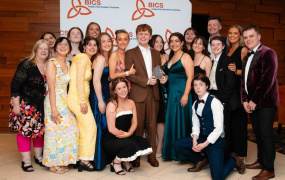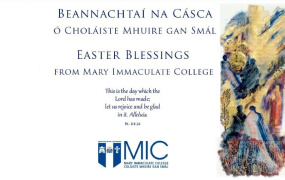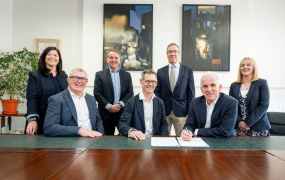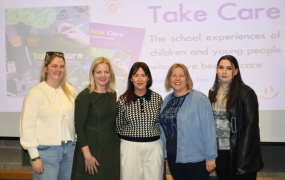MIC’s Response
The staff and students of Mary Immaculate College are working together with new communities to develop informed responses to all communities seeking refuge in Ireland. Our responses include engagement, teaching English language, resources and information sharing, supporting prospective students transition to our College and access information on programmes at other higher education institutions, and providing sanctuary to researchers and academics who need space to continue with their scholarly work.
Student Response
With the collaboration of MISU, a student group have been meeting on a weekly basis to brainstorm responses. In addition, students who are TEFL/ESOL trained are due to volunteer with the LCETB in the coming weeks to offer classroom support to bespoke English language classes. The MISU may offer the use of the SU Lounge if required in the future for community meetings or activities. Another area under exploration is peer mentoring.
MIC students formed a team to help manage the Ukraine Information table at the MIC Open Day on 29 April.
Undergraduate student are engaged in the Tuition Project at MIC Thurles where they run a series of online tutorials for young people in Direct Provision primarily in maths and they are currently exploring other ways to connect with the Ukraine community.
Staff Response
This diverse and impressive set of activates can be consolidated under the MIC College of Sanctuary (CoS) pillar of work as we move toward designation. We are mindful that there are many more displaced citizens in Direct Provision from other parts of the world that need support. Our evolving CoS work will ensure that we address equity in terms of transition and support to higher education. A meeting to revisit the MIC Sanctuary designation was convened in April 2022 to share a range of underpinning activities and initiatives activities (present and future) that support refugees, asylum seekers and other migrants into the MIC community and fostering a culture of welcome and inclusion for all those seeking sanctuary.
As part of the MIC response to those seeking asylum in Ireland as part of the International Protection system and our commitment to Sanctuary, we are offering MIC English Language Programme during 2022-2023 as a partnership.
The MIC English Language Programme is a collaboration between the MIC Office for Equality, Diversity, Inclusion and Interculturalism (EDII), the MIC Department of English Language and Literature with the Limerick and Clare Education and Training Board (LCETB) and the Jesuit Refugee Service (JRS).
The MIC English Language Programme is a 6-week academic and general English course provided for migrants who wish to transition to study within higher education in Ireland and who may need to improve their English for academic or employment purposes.
The course is led and taught by MIC Lecturer, Ilona Costelloe and Giana Hennigan with Head of Department, English Language and Literature, Dr. Eugene O’Brien.
Further details on MIC English Language Programme:
Learning outcomes:
- To cultivate language awareness;
- To enhance socio-cultural knowledge and inter-cultural awareness;
- To develop listening, reading, and writing skills;
- To develop confidence in spoken English;
- To introduce students to our MIC Campus.
For further information, please contact Ilona Costelloe at Ilona.Costelloe@mic.ul.ie.
As part of the MIC response to the Ukraine community and other displaced people, we are offering the inaugural MIC Pre-sessional English Language Programme during the summer 2022.
The MIC Pre-sessional English Language Programme is a 10-week academic English course provided for migrants who would like to transition to study within higher education in Ireland and who may need to improve their English for academic purposes.
The Programme is a collaboration between the MIC Office for Equality, Diversity, Inclusion and Interculturalism (EDII), the MIC Department of English Language and Literature in partnership with the Limerick and Clare Education and Training Board (LCETB) and funded by MIC.
The course is led and taught by MIC Lecturer, Ilona Costelloe, who has extensive experience and expertise in supporting new English language learners.
Further details on MIC English Language Programme:
- Programme dates: 7 June-12 August 2022
- Weekly schedule: Tuesday to Friday 10am-2pm
- Course length: 10 weeks (140 hours)
- Minimum Entry Requirement: B2 or IELTS 5.5/6.0
- Course delivery: In-person classes in MIC, Limerick
Learning outcomes:
- To raise the overall level of English
- To improve the ability to write academic essays
- To develop listening, reading, and writing skills
- To develop confidence in spoken English through presentations
- To introduce students to our MIC Campus
For further information, please contact Ilona Costelloe at Ilona.costelloe@mic.ul.ie.
A group of colleagues in the Faculty of Education have formed the ‘Migrant, Refugee and Asylum Seeker Learners Response Group’ to address the needs of teachers to support inclusion in the classroom and school. As part of this a national needs analysis is currently being undertaken with 3200 primary schools so that our response meets educational and pedagogical needs. In addition, there is an aim to deliver the online ‘MIC Teaching for Inclusion Seminar Series’ to support and share knowledge with the wider teaching community to help support an ethos and practice of diversity, inclusion and integration in the classroom and schools. If any of you are interested in contributing and sharing your knowledge please email EducationOffice@mic.ul.ie
We are exploring with the Department of English Language and Literacy the roll out of English Language courses over the summer months (perhaps beyond) to improve literacy and conversational skills and/or to prepare for academic programmes aimed at Ukraine and other displaced citizens.
Some other Departments (French and German) are looking at ways to share their knowledge and courses though an auditing process.
MIC TEAL Project
The MIC TEAL Project (TED EAL) is an initiative of the TED (Transforming Education through Dialogue) Project located in the Curriculum Development Unit at MIC. There are nine DEIS schools involved in TEAL. TEAL, through its work with primary and post-primary schools in DEIS Band 1, plans to support their designation as Schools of Sanctuary and create deeper ways for inclusion.
In 2020, TEAL received a European Language Label Award (ELL) for their innovative content development and inclusive practices. In 2022 TEAL received the John Coolahan Award from the Teaching Council of Ireland for ‘its potential to make impact in leading learning through evidenced-informed practices, inclusion, high levels of collaboration between schools and HEI-based researchers and supporting teachers’ learning of plurilingual practices’.
To see the TEAL work in action, watch this video here.
Read the TEAL newsletter.
EDNIP
EDNIP (Embracing Diversity, Nurturing Integration Project) ran a series of activities for families (parents and children) over the first week of the school Easter holidays. A family trip to King John’s Castle led by Paul O’ Brien, a workshop on the theme of Belonging and Identity in the Hunt Museum and a Treasure Hunt around Baggot Estate. 52 families participated in activities across the week a total of 104 children including a number of newly arrived Ukrainian families. EDNIP works in partnership with 5 primary schools in Limerick City who have families from 46 different countries of origin to support integration and celebrate diversity in our schools.
The MIC Student Counselling Service is exploring ways in which it can contribute to the current College initiatives through its’ trauma informed, cultural and anti-discrimination approach to practice.
Dr Paul O’Brien has continued to offer his services by way of ‘Historical Walking Tours’ to our agency partners and to MIC to support Ukrainian and other displaced citizens that might become part of our community in 2022.
Africa Day is observed annually in Africa and around the world on 25 May to commemorate the formation of the African Union (AU) and unity of the continent. Since 2006 in Ireland, the day has witnessed exponential growth in the celebration of Africa’s culture, stamped with flagship events nationwide and organised by Irish Aid at the Department of Foreign Affairs.
As part of MIC African student cohort, we would like to display some aspects of African culture, examine the rearing of children in Nigeria and Ireland, and finally, highlight the difficult decisions and conditions under which some Africans flee for safety. That is why we have themed our tribute as 'The Way We Left'.
What is also special is that we are introducing an interactive round-table discussion which will see the generous participation of our attendees to offer their thoughts on how best we can listen to polarising sides in migration discourse with the goal to achieve better practice and equality. Therefore, you are assured of a range of perspectives and insights in relation to culture, migration, integration, and education. Please join us to celebrate on Tuesday 31 May, from 10am-1pm in Room T118 in the TARA Building.
See full programme here.
Led by Dr Finn O’Murchú and Santhi Corcoran this event, ‘Interagency Collaboration in Supporting Diversity in Schools’, will be held in June 2022 with focus on issues of identity and inclusion with inter-agency responses to youth engagement.
Thousands of Irish migrants travelled to continental Europe in the sixteenth, seventeenth and eighteenth centuries. Limerick occupies a particularly important place in the history of the ‘Wild Geese’. In the immediate aftermath of the Treaty of Limerick (1691), 15,000 soldiers and an estimated 4,000 civilians (mainly women and children), left Ireland for France. This was, however, part of a much wider movement of people – soldiers, students, priests, merchants, the poor; men, women and children – who moved from Ireland to France, Flanders, Spain, Portugal, the Italian states, the Holy Roman Empire, and elsewhere between the 1500s and the early 1800s. Many Irish migrants also moved beyond Europe, into the expanding Spanish, Portuguese and French Empires.
This conference – Wild Geese: Irish Migrants in Early Modern Europe – brings a group of historians and speakers to Limerick to consider the latest research on the ‘Irish in Europe’, as well as to reflect upon the links between Ireland’s history of migration and the nature of migration in Ireland today.
See programme here.
Led by Dr Patricia Kieran and Dr Brighid Golden, the Programme has been introduced as a new activity for MIC staff and students. 32 members of the MIC community have gathered to share skills and expertise. Community sponsorship is a new way to welcome refugees to Ireland. Two houses have been sourced for two families seeking international protection. A fundraising campaign that you will be invited to participate in will follow in the coming weeks.
As part of our on-campus Open Day on Friday 29 April, MIC had a dedicated team on hand to help displaced Ukrainian citizens identify study and research options at MIC, and in Ireland in general, for the next academic year. The event was promoted directly to all Ukrainian citizens currently residing in hotel accommodation in the Limerick, Clare and Tipperary regions in addition to a radio and comprehensive social media campaign (both in English and Ukrainian with the help of a linguist form the Ukraine). More information available here. At present, Ukraine students will be liable for the EU rate of fees. However, this may change in the coming weeks.
A group of 10 MIC staff, retired staff and students, through the Healthy Campus Office, took part in the ‘Great Limerick Run’ on Sunday 1 May to raise funds for Ukraine.







